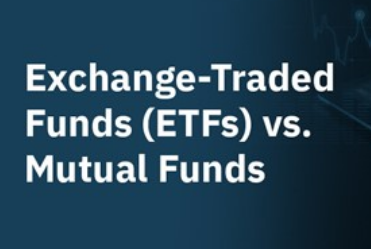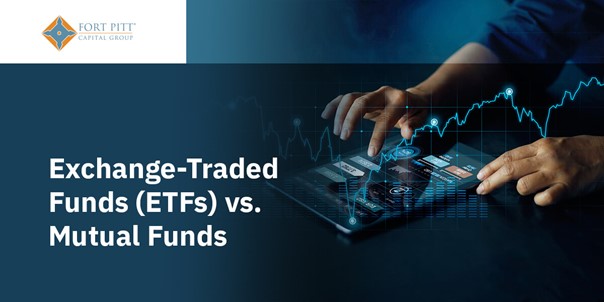Exchange-Traded Funds (ETFs) vs. Mutual Funds

Written by: Skylar Riddle, CFP® | Financial Advisor
When considering investment strategies, exchange-traded funds and mutual funds are almost always included in the conversation. However, for investors, the distinction between these two investments can be blurry. Although they are similar, several key differences can contribute to both the performance of the investment and their suitability to an investor.
What Is an ETF?
An exchange-traded fund, or ETF, is a type of pooled investment designed to reduce investor risk. ETFs keep tabs on a pre-determined set of assets and loop them into one package. These assets can include stocks, bonds, commodities, and more. The ETF package is tradable like any stock.
When you buy into an ETF, you purchase a share of the fund provider’s assets and gain access to their index — the system for monitoring each component’s performance. Your share does not give you ownership of a particular asset, but you will receive dividend payments for each stock in the index.
Types of ETFs
Here are a few examples of ETFs:
- Bond or fixed-income ETFs: Investments in the S. bond market that diversify your portfolio and create stability.
- Commodity ETFs: Investments in alternatives to stocks like oil and gold.
- Currency ETFs: Investments in a single currency — such as the U.S. dollar — or multiple currencies to hedge risk.
- Equity ETFs: Investments that track numerous equities, such as businesses of different sizes or stocks from a particular country.
- Real estate investment trust (REIT) ETFs: Investments in a narrow or broad selection of real estate properties — shareholders receive at least 90% of the fund’s taxable income.
What Is a Mutual Fund?
A mutual fund is another vehicle comprising a pool of investments like stocks and bonds. In the case of mutual funds, a professional money manager oversees the allocation of assets. The money manager attempts to accrue the most successful assets, and they will adjust the pool over time. These pool will contain numerous securities in order to create the most sustainable investment portfolio for participants.
Through mutual funds, each investor experiences gains and losses proportionate to their investment. Participants receive income through capital gains distribution, while interest comes as a dividend. Mutual funds are subject to capital gains taxation.
Types of Mutual Funds
The following are some of the most common examples of mutual funds:
- Bond funds: Investments in government-issued debt that, in most cases, yield annual interest payments.
- Money market funds: Short-term government-issued debt investments that mature within a year.
- Stock funds: Corporate stock investments like long-term growth funds, income funds with regular dividends, index funds driven by specific markets, and industry-based sector funds.
- Target-date funds: Investments into bonds, stocks with more as part of a time-based strategy that works toward a retirement date.
Similarities Between ETFs and Mutual Funds
Here’s where ETFs and mutual funds align.
Different Investment Options
A wide range of ETFs and mutual funds are available. You can choose from strategies like total market, growth, high-yield, sector rotation, or almost anything else.
Diversification
ETFs and mutual funds invest in a wide range of individual stocks or bonds and occasionally more exotic investments such as commodities.
Professional Management
Both ETFs and mutual funds are managed by financial professionals who select what to invest in and charge a fee to manage the money.
Differences Between ETFs and Mutual Funds
While ETFs and mutual funds are similar in many ways, they are also quite distinct. Differences include the following.
Fee Structure
Due to the different management styles of the funds, the fee structure is often different. ETFs may have expense ratios (percentage of fund assets used for administrative, management, advertising, etc.) of 0.05% or even lower, while the average mutual fund has an expense ratio of 0.66%. The expense ratios of index mutual funds are typically more on par with ETFs.
Another possible fee with mutual funds is a sales fee or load. Suppose an investor has a short time horizon for their investment. In that case, mutual funds are generally not a good option because the load can eat away at any earnings.
Liquidity
As the name implies, ETFs trade on an exchange. This means that an investor can purchase or sell shares at the market price throughout the day. ETF shares can also be purchased on margin or sold short. In contrast, mutual fund shares trade once per day at the net asset value (NAV) set prior to trading. If you trade often or would like some control over the price at which you invest, ETFs may be the better option.
Management Style
ETFs are generally passively managed, while mutual funds are typically actively managed. As a result, many ETFs attempt to mirror a benchmark while mutual funds try to beat the market.
Minimum Investment
For an ETF, the minimum investment is the cost of a single share. For some ETFs, this can be lower than $50. Mutual funds often have investment minimums of a couple of thousand dollars or more. Especially for young investors, the investment minimums can make mutual funds a difficult investment.
Recurring Investments
Once invested in an ETF, you cannot make recurring investments or withdrawals. However, with mutual funds, both techniques are possible. Suppose you want to use a dollar-cost averaging strategy. In that case, mutual funds can be a very useful set-it-and-forget-it option.
Speak to a Financial Professional About Your Financial Situational
Suppose you are still unsure whether an ETF or mutual fund is the appropriate choice for your investment strategy. A financial advisor can analyze your situation and help suggest the best investment for your risk profile and goals. Browse Fort Pitt Capital Group’s financial services online or get in touch for more information.
About the Author:
Skylar Riddle, CFP®
Financial Advisor
Fort Pitt Capital Group, LLC
680 Andersen Drive, Pittsburgh, PA 15220
(412) 921-1822 | sriddle@fortpittcapital.com




